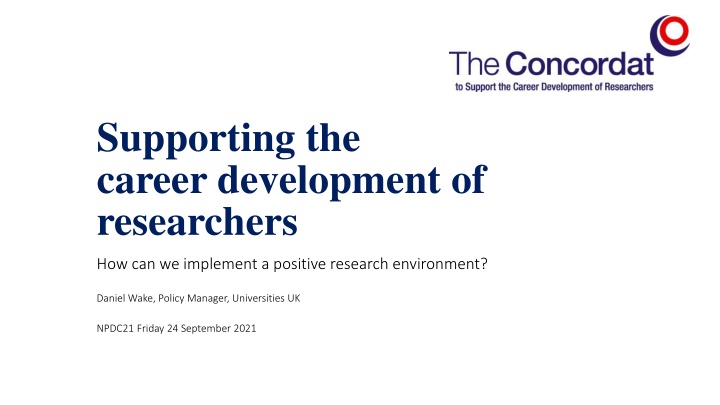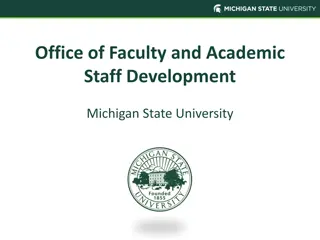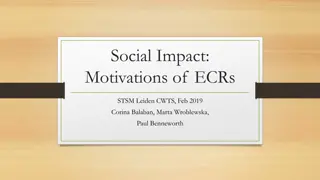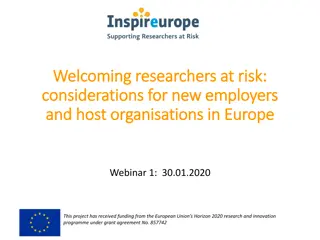
Implementing Positive Research Environment for Career Development of Researchers
Learn about the initiatives and principles outlined in the Concordat to support the career development of researchers and create a healthy research culture. Explore the stakeholders involved and the evolution of policies aimed at enhancing the professional growth of researchers in academia.
Download Presentation

Please find below an Image/Link to download the presentation.
The content on the website is provided AS IS for your information and personal use only. It may not be sold, licensed, or shared on other websites without obtaining consent from the author. If you encounter any issues during the download, it is possible that the publisher has removed the file from their server.
You are allowed to download the files provided on this website for personal or commercial use, subject to the condition that they are used lawfully. All files are the property of their respective owners.
The content on the website is provided AS IS for your information and personal use only. It may not be sold, licensed, or shared on other websites without obtaining consent from the author.
E N D
Presentation Transcript
Supporting the career development of researchers How can we implement a positive research environment? Daniel Wake, Policy Manager, Universities UK NPDC21 Friday 24 September 2021
2 SUPPORTING THE CAREER DEVELOPMENT OF RESEARCHERS: HOW CAN WE IMPLEMENT A POSITIVE RESEARCH ENVIRONMENT? There is still much to do to create the healthy and supportive culture needed to ensure our researchers are given every opportunity to thrive and realise their potential Professor Julia Buckingham CBE Chair of the Researcher Development Concordat Strategy Group and Vice-Chancellor and President of Brunel University London
Why do we have a Concordat? When did the Concordat come about, and has it made a difference?
4 SUPPORTING THE CAREER DEVELOPMENT OF RESEARCHERS: HOW CAN WE IMPLEMENT A POSITIVE RESEARCH ENVIRONMENT? When did it come about? Concordat to Provide a Framework for the Career Management of Contract Research Staff, 1996 European Charter for Researchers and Code of Conduct for the Recruitment of Researchers, 2005 Concordat to Support the Career Development of Researchers, 2008 Independent review and consultation, 2018 19
5 SUPPORTING THE CAREER DEVELOPMENT OF RESEARCHERS: HOW CAN WE IMPLEMENT A POSITIVE RESEARCH ENVIRONMENT? https://www.vitae.ac.uk/vitae-publications/culture-employment-and- development-in-academic-research-survey-cedars-aggregate-results-launched
Principles and stakeholders What are the principles of the Concordat, and who is responsible for their implementation?
7 SUPPORTING THE CAREER DEVELOPMENT OF RESEARCHERS: HOW CAN WE IMPLEMENT A POSITIVE RESEARCH ENVIRONMENT? Core principles Stakeholder groups Environment and culture Researchers Excellent research requires a supportive and inclusive research culture Employed primarily to conduct research Managers of researchers Employment Having direct line management responsibility for researchers Researchers are recruited, employed and managed under conditions that recognise their value and importance Institutions Professional and career development Universities and research institutes as employers of researchers Funders Professional and career development are integral to enabling researchers to develop their full potential Providing funding for public or private research
8 SUPPORTING THE CAREER DEVELOPMENT OF RESEARCHERS: HOW CAN WE IMPLEMENT A POSITIVE RESEARCH ENVIRONMENT? Environment and culture Institutions must promote good mental health and wellbeing through, e.g., effective management of workloads and people Funders must consider how funding opportunities and policies can facilitate different patterns and ways of working Managers of researchers must promote a healthy working environment Researchers must take positive action towards maintaining their wellbeing and mental health
9 SUPPORTING THE CAREER DEVELOPMENT OF RESEARCHERS: HOW CAN WE IMPLEMENT A POSITIVE RESEARCH ENVIRONMENT? Employment Institutions must seek to improve job security for researchers, e.g., through redeployment processes and greater use of open-ended contracts Funders must support institutions to develop policies and frameworks to promote sustainable employment arrangements and enhance job security Signatories must produce an annual report to their governing body, which includes measures of success, an implementation plan and progress commit to collective action on seeking ways to provide more security of employment for researchers
10 SUPPORTING THE CAREER DEVELOPMENT OF RESEARCHERS: HOW CAN WE IMPLEMENT A POSITIVE RESEARCH ENVIRONMENT? Professional and career development Training, support and time Institutions must provide opportunities and time for researchers to engage in a minimum of 10 days professional development pro rata per year, recognising that researchers will pursue careers across a wide range of employment sectors Managers of researchers must allocate a minimum of 10 days pro rata per year, for their researchers to engage with professional development Funders must incorporate professional development into funding calls, terms and conditions, to include a minimum of 10 days professional development pro rata per year Researchers must take ownership of their career, including engaging in a minimum of 10 days professional development pro rata per year
Successful implementation What is needed for success?
12 SUPPORTING THE CAREER DEVELOPMENT OF RESEARCHERS: HOW CAN WE IMPLEMENT A POSITIVE RESEARCH ENVIRONMENT? What is needed for success? We all recognise our collective responsibility and accountability Institutions ensure effective implementation at all levels, raise awareness, gather feedback, and report on progress Funders ensure funding calls, selection processes, reporting etc., promote and support good employment practices Managers have the skills, time and willingness to support researchers in broadest sense Researchers are aware, proactive, and engaged in making their voices heard
13 SUPPORTING THE CAREER DEVELOPMENT OF RESEARCHERS: HOW CAN WE IMPLEMENT A POSITIVE RESEARCH ENVIRONMENT?
14 SUPPORTING THE CAREER DEVELOPMENT OF RESEARCHERS: HOW CAN WE IMPLEMENT A POSITIVE RESEARCH ENVIRONMENT? People Ensuring equality of opportunity between researchers Improving job security and effective re- deployment processes Merit based recruitment and effective inductions Engage researchers in policy development Training in EDI, well-being and mental health Access to R&D career and skills gaps filled Effective recognition and opportunity for success Time to develop leadership skills / research identity Support career diversity eg via mentors, training, secondments 10 days+ of professional development for staff Acknowledging and support careers beyond academia Access to career paths across sectors and disciplines Leadership and management training for managers Line / project management training opportunities Championing excellent people management Access to career management advice Time to develop leadership skills Better leadership skills at all levels
15 SUPPORTING THE CAREER DEVELOPMENT OF RESEARCHERS: HOW CAN WE IMPLEMENT A POSITIVE RESEARCH ENVIRONMENT? Culture Promoting sustainable employment and career progression Manager training to manage researchers effectively Promote good mental health and wellbeing and reporting misconduct An inclusive and respectful culture that attracts and retains a diversity of people Access to research funding at all career levels Improving job security for researchers Equitable and transparent recruitment, promotion and reward Opportunities / time for researchers to develop their identity Opportunities / time to develop leadership skills Clear pathways that recognise the full range of contributions Clear recognition and reward for excellent research and innovation Appropriate credit and recognition for endeavours Recognition and action as stakeholders in the wider academic community Engagement with the public
16 SUPPORTING THE CAREER DEVELOPMENT OF RESEARCHERS: HOW CAN WE IMPLEMENT A POSITIVE RESEARCH ENVIRONMENT? Talent Reviewing the quality of the research environment and culture, with feedback from researchers and using the outcomes to improve institutional practice Consideration of flexible working requests and other arrangements to support personal lives of researchers Funders ensuring requirements and selection processes offer equality of opportunity Widening access to careers and broadening the definition of a R&D career Stronger job security and championing transparent promotion criteria and workload allocation Merit-based recognition and reward UK is the most exciting place in the world for top research and innovation talent Encourage better process and procedure to reach the aim to achieve a more attractive R&D and innovation landscape.
Measuring progress How can we monitor the Concordat s implementation?
18 SUPPORTING THE CAREER DEVELOPMENT OF RESEARCHERS: HOW CAN WE IMPLEMENT A POSITIVE RESEARCH ENVIRONMENT? Measuring progress Culture, Employment and Development in Academic Research Survey Reflects the Researcher Development Concordat principles Aimed at all staff engaged in research Runs every two years hosted by institutions: April - June 2021 UK aggregate results and benchmarking of institutional results https://www.vitae.ac.uk/impact-and-evaluation/cedars
19 SUPPORTING THE CAREER DEVELOPMENT OF RESEARCHERS: HOW CAN WE IMPLEMENT A POSITIVE RESEARCH ENVIRONMENT? Committing to the Concordat Raise visibility and champion its Principles Identify a senior manager champion Researchers formally represented in developing and monitoring implementation Undertake a gap analysis to compare their policies and practice Draw up and publish an action plan within a year of signing the Concordat Gathering the views of researchers to inform and improve the organisation s approach and progress Produce an annual report to their governing body or equivalent authority
20 SUPPORTING THE CAREER DEVELOPMENT OF RESEARCHERS: HOW CAN WE IMPLEMENT A POSITIVE RESEARCH ENVIRONMENT? Concordat governance Researcher Development Concordat Strategy Group Sharing best practice Annual reporting A living document Major reviews
21 SUPPORTING THE CAREER DEVELOPMENT OF RESEARCHERS: HOW CAN WE IMPLEMENT A POSITIVE RESEARCH ENVIRONMENT?
22 Thank you If you have questions about the Researcher Development Concordat, please contact CDRsecretariat@universitiesuk.ac.uk






















